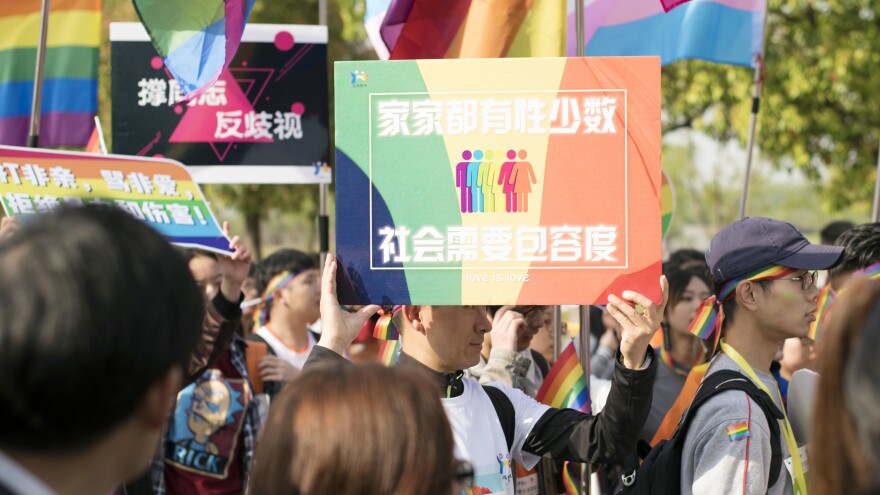Chinese social media giant Sina Weibo has reversed its ban on publishing homosexual content, days after announcing the policy. The service, which has nearly 400 million users, drew outrage for lumping gay-themed content in with violent and pornographic material.
"There followed a storm of online criticism of the site," NPR's Rob Schmitz reports from Shanghai.
The company's stock also took a hit. Weibo's shares fell sharply on the Nasdaq market on Friday, losing nearly 7 percent of their value and closing at $114.18. After Monday's reversal, shares had risen more than 2 percent by 2:30 p.m. ET.
On Friday, a notice from Weibo's administrator justified the ban as part of an effort to make the online environment clean and "harmonious," saying it had already "cleared" more than 56,000 violations and closed more than 100 accounts. But today, the administrator's account said the "clean-up" of the site would focus on pornography and violence — not homosexual content.
People who were angry with the decision to remove homosexual content from the platform used hashtags such as "I am gay" or "I am illegal," according to the social media news site What's On Weibo.
Homosexuality has been legal in China since 1997, as Rob reported for NPR's Newscast unit:
"Many incensed users said the crackdown was another sign of discrimination against lesbian, gay, bisexual and transgender people in a country where homosexuality was decriminalized two decades ago.
"Even the People's Daily, one of China's largest state-run newspapers, offered a veiled criticism of Weibo's announcement. By Monday morning, Weibo had reversed its decision."
As the South China Morning Post reports, on Sunday the People's Daily "encouraged tolerance towards gay people, but added that 'vulgar' content must be removed regardless of sexual orientation."
Some of the most popular posts against Weibo's ban came from the advocacy group The Voice of Gay, one of which was reposted tens of thousands of times by Saturday, the People's Daily says.
Other criticisms came from regular people, such as a user named Shanghai Mei Jie, who said that her son is gay — and that they both love China. She went on to say that despite legal gains in recent years, millions of Chinese homosexuals still suffer from the effects of discrimination and a lack of understanding.
The public stumble came as the Beijing-based Weibo has enjoyed record profits and watched its stock price rise since it was listed on the Nasdaq exchange back in 2014.
In the most recent fiscal year, Weibo reported net revenues of $1.15 billion, driven by advertising revenues of $996.7 million. Both figures represent a rise of more than 75 percent from the previous year.
Copyright 2021 NPR. To see more, visit https://www.npr.org. 9(MDAxNzg0MDExMDEyMTYyMjc1MDE3NGVmMw004))







